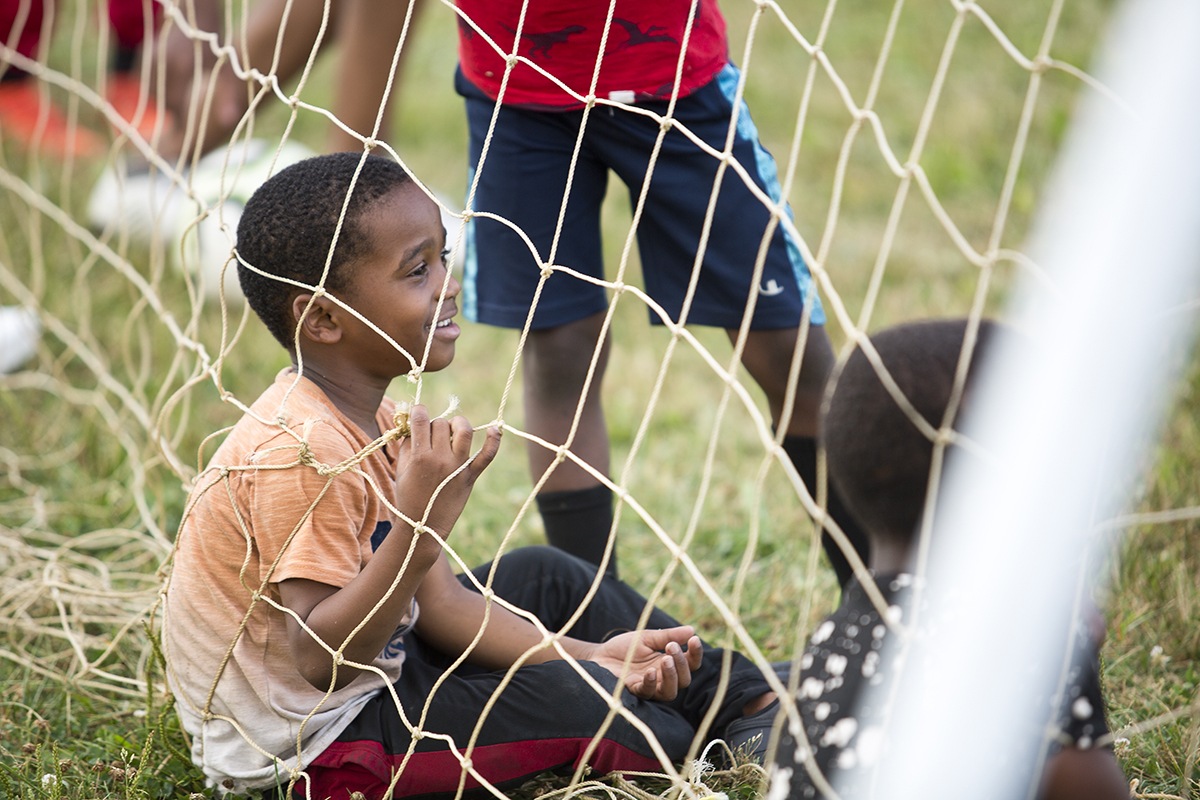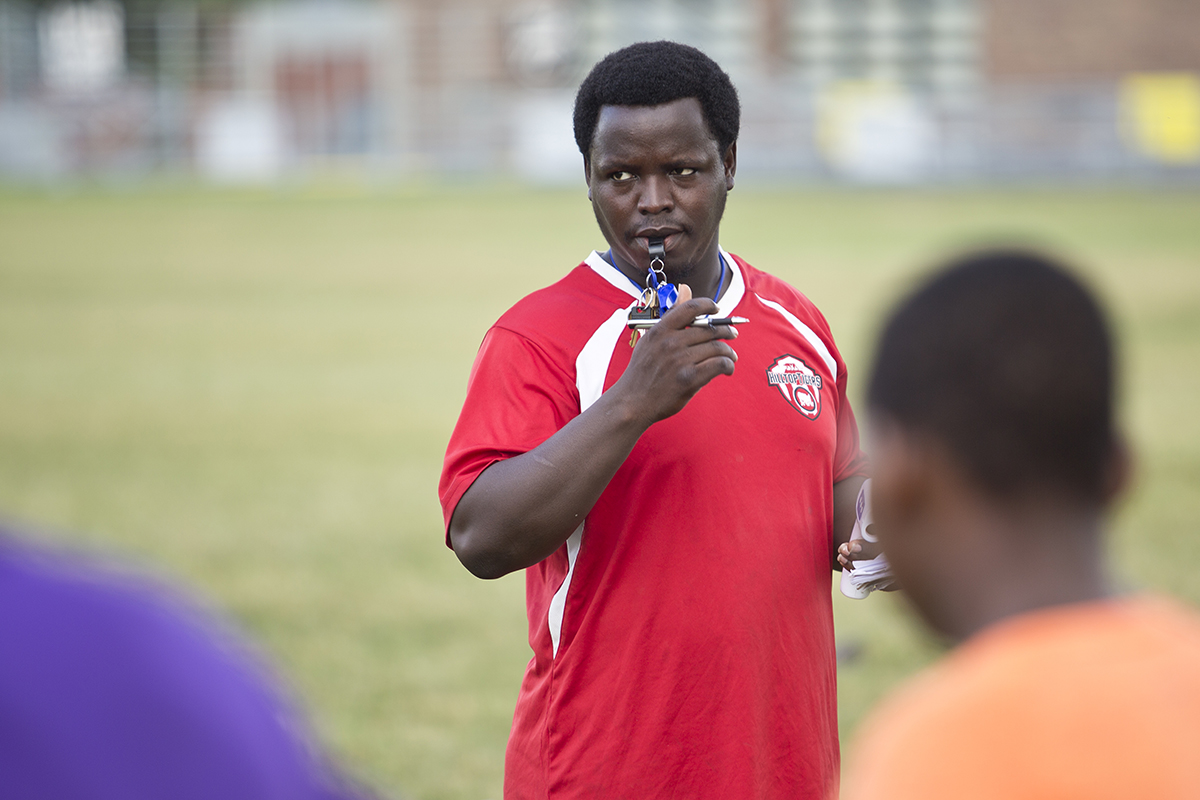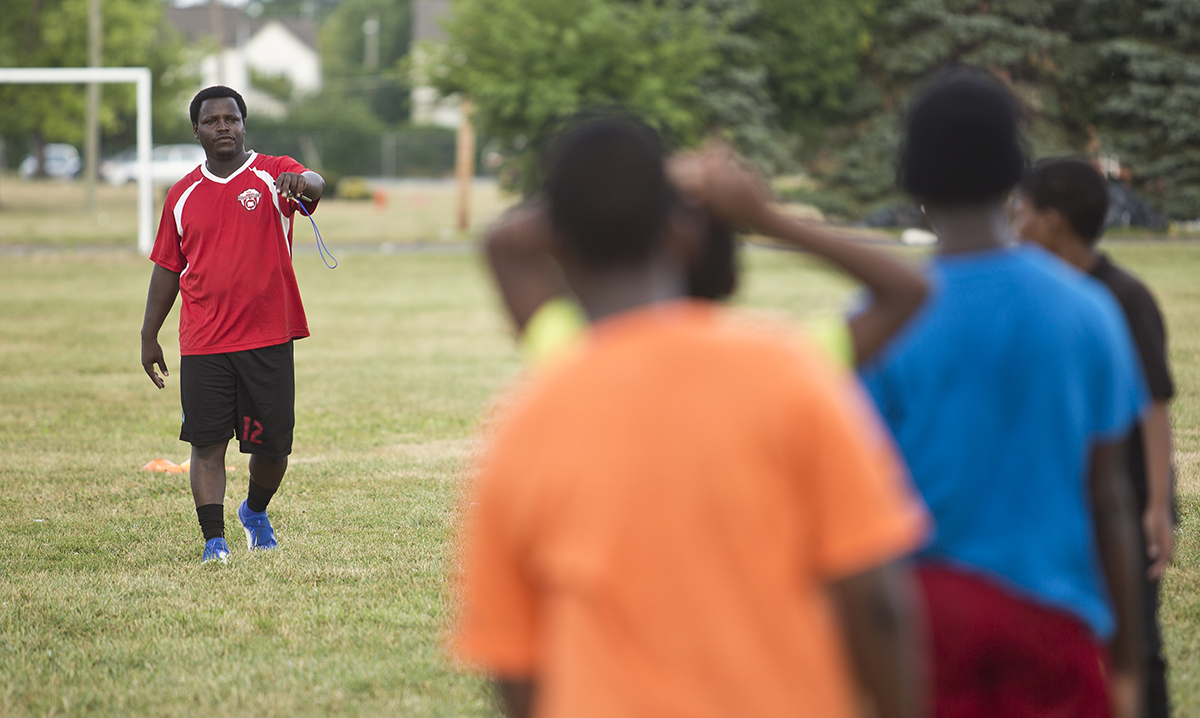Siyat Mohamed
Opportunities are rare and often fleeting when you’re born in a Somali Bantu refugee camp in Kenya, eventually immigrate to Columbus and live in the Wedgewood Village Apartments, a Hilltop complex where gangs, drugs and violence are a way of life. Toss in the fact that your father stayed behind in the refugee camp to care for and protect the extended family, leaving your mother, who doesn’t speak English, to provide for four boys in a foreign land.
This is the life of Siyat Mohamed, 22, who, despite—or maybe because of—these hurdles, has become a community leader, soccer coach, mentor and role model. He’s a new husband and father, and is committed to a career of public service. He started a youth soccer team through the nonprofit MY Project USA and works as a teaching assistant at Wedgewood Middle School.
“You don’t get to decide where you’re born or what you get in life,” Mohamed said. “But you do get to decide how to act on it. I grew up around gangs and senseless killings and watched too many people suffer. I made a promise to myself to get something started and to help my people.”
Mohamed’s story begins several thousand miles away in the refugee camps of Kenya. The Somali Bantu are descendants of slaves taken from Tanzania and Mozambique in the late 1800s to the southern coast of Somali. The Somali Bantu, who are predominately Muslim, “have remained a persecuted minority in Somalia and cannot return to the homes they fled there,” according to the U.S. State Department. The first refugees arrived in this country in 2003; Mohamed and his family came a year later.
Mohamed’s most vivid memories of the refugee camp are playing soccer in the dirt. Sports were an outlet—the only outlet. “We played barefoot and made our own goals,” Mohamed said. They also made their own makeshift soccer balls. “We took some yarn and wrapped it into a ball until it became big enough, and then we wrapped some plastic around it,” Mohamed recalled.
Columbus has been one of the primary relocation centers for the Somali Bantu, and many reside in the Wedgewood Village Apartments. “I would say it’s the most dangerous apartment complex in Columbus,” said Mohamed, who was 6 years old when he arrived in Columbus. “I lost a lot of close friends, teenagers who had a full life ahead of them.”
Mohamed’s path was made a bit easier by several strong women who helped guide him in the right direction. Starting with his mother, Fatuma Mohamed. She worked multiple jobs to put food on the table and did her best to keep her four sons out of harm’s way. “She did everything for us, but I didn’t have the best childhood possible,” Mohamed said, adding he learned “through trial and error and making mistakes.”
Mohamed created the youth soccer program while attending Westland High School, where he played soccer. He needed some help and reached out to Zerqa Abid, the founder of MY Project USA, a Hilltop-based nonprofit that provides programs and services to the youth of underserved neighborhoods. It is one of the city’s largest Muslim social service agencies.
A soccer participant listens at the start of practice. Rob Hardin | Dispatch Magazines
Siyat Mohamed oversees players running drills. Rob Hardin | Dispatch Magazines
“I cannot tell you how special Siyat is,” said Abid, who then proceeded to do her best to describe why her protégé is so special. “Here was this 16-year-old taking care of 7- to 10-year-olds, trying to save them from drugs and gangs. I was very impressed and registered his team into our gym and began working with him closely. … He wants to use soccer to change their lives, and I see him doing that.”
Abid, the Dispatch Media Group’s Everyday Hero for 2019, was so impressed she eventually hired Mohamed, who now runs the MY Project USA Hilltop Tigers youth soccer program, which includes about 100 kids.
“Siyat is a natural coach,” said Russ Harris, a MY Projects USA board member and director of the organization’s sports program. “He understands the poverty these kids live in and offers sports and fitness as an alternative to drugs and gangs. The kids listen to him because he’s one of them. … The kids believe in Siyat because they know he believes in them.”
Mohamed says there is hope for the players he coaches, and that he can help them develop the skills they need to take advantage of the slim opportunities available to them. “The kids who are raised in a better environment, that gives them a head start,” Mohamed said. “Their parents set certain standards and, on top of that, they have all sorts of opportunities as soon as they step out the door. When (these kids) step out the door, maybe it’s safer for them to stay in the house.”
Rob Hardin | Dispatch Magazines
Diane Campbell, principal of Wedgewood Middle School, was also impressed when she first met Mohamed. Determined to expand his reach and impact more local youth, Mohamed met with Campbell a couple years ago to see if he could visit the school and recruit more kids into MY Project USA programs.
“I was so impressed by this young man that I eventually hired him to be an instructional assistant,” Campbell said. Her school is 61% nonwhite, with many Latina and Somali students. “What impressed me was Siyat was so invested in the community. He puts all his free time into the community,” Campbell said.
Campbell is convinced Mohamed will achieve even bigger and better things in the years to come. “I think he will become a huge partner with the city and my dream, once I become a millionaire,” she said with a laugh, “is to give back and to financially help him create a startup nonprofit to do what he’s doing now on an even bigger scale.”
Impacting more lives is Mohamed’s goal, and he seems to be an unstoppable force for good. “My life revolves around my community, my people and all the youth,” he said. “Seeing the impact I have on these kids inspires me to get up out of bed. I’m the only change-maker in many of their lives.”
Mohamed’s father remains in the refugee camp in Kenya. “We call him on WhatsApp, if he has the gigabytes,” he said. Mohamed is now a father; his wife, Mumina Hassan, gave birth to a baby girl, Uwah, on June 5. They live in an apartment complex in Lincoln Park West, near Hollywood Casino Columbus, along with his mother and two of his brothers.
“I always looked at the children in the community as my own,” he said. “And now that I have one of my own, the love grew even more.”


